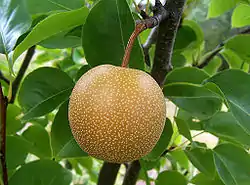山梨
Japanese

山梨 (yamanashi): the leaves and fruit of the Asian pear.
| Kanji in this term | |
|---|---|
| 山 | 梨 |
| やま Grade: 1 |
なし Grade: 4 |
| kun’yomi | |
Pronunciation
Noun
山梨 or 山梨 • (yamanashi)
- Pyrus pyrifolia, especially P. p. var. pyrifolia: nashi pear, sand pear, Asian pear, apple pear
Usage notes
As with many terms that name organisms, this term is often spelled in katakana, especially in biological contexts (where katakana is customary), as ヤマナシ.
Proper noun
山梨 • (Yamanashi)
Alternative forms
References
- Shōgaku Tosho (1988) 国語大辞典(新装版) [Unabridged Dictionary of Japanese (Revised Edition)] (in Japanese), Tōkyō: Shogakukan, →ISBN
- Matsumura, Akira, editor (2006), 大辞林 [Daijirin] (in Japanese), Third edition, Tōkyō: Sanseidō, →ISBN
- NHK Broadcasting Culture Research Institute, editor (1998), NHK日本語発音アクセント辞典 [NHK Japanese Pronunciation Accent Dictionary] (in Japanese), Tōkyō: NHK Publishing, →ISBN
This article is issued from Wiktionary. The text is licensed under Creative Commons - Attribution - Sharealike. Additional terms may apply for the media files.